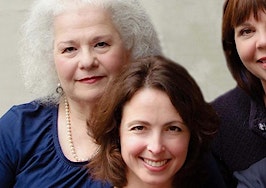- Don't let fear of losing income stop you from making a move to another brokerage if it's going to up your game.
- Use the opportunity to communicate with all your clients when you are moving companies and get them excited about it.
- Days on market are irrelevant compared to getting the magic number.
In the once-sleepy, now-thriving real estate market of Cambridge, Massachusetts — a hub for the pharmaceutical industry, MIT and Harvard offshoots and their highly skilled workers –many of the top agents have been with the same firm for years.
This was the case with John Petrowsky and Christian Jones. The two agents were at Hammond Real Estate, a large local brokerage, for 27 years and 10 years, respectively.

But they felt the need for something new and in January made the jump to Compass, launching the new Cambridge office for the company, which came to Boston in 2015.
Since launching last September, Compass has hired 29 top-producing agents from around the Boston and Cambridge markets.
“The reason that we moved was we were not really feeling invigorated, even though we were No. 1 in our former office. We were intrigued by the marketing, challenge, the aesthetic of Compass, and the support that our clients gave to us on learning of our move,” said Jones.
The top-producing Cambridge team known as the Petrowsky Jones Group at Compass were pursued by several firms.
A new name with new methods
Compass is still a new name in the Boston market, but with buyers coming in from New York, Los Angeles and other big U.S. markets as well as from overseas, it’s not a problem, said the agents.
“The good thing about Compass is it has a different model from anything else in Cambridge — and it positions us in a different way,” said Petrowsky.
At the moment there is one other agent in the Compass Cambridge office, another experienced player and more hires are expected this year.
“We are in startup mode — it’s very exciting, we love it,” said Petrowsky.
[Tweet “John Petrowsky: ‘We are in startup mode — it’s very exciting.'”]
And the first quarter alone has made it worthwhile — the Petrowsky Jones Group has closed $11.2 million in sales, the highest dollar volume of first-quarter sales the team has done in the last five years, up 30 percent over last year. Their sales volume total last year was $58 million.
A move to a new brokerage doesn’t have to lead to initial income sacrifice
“Most agents bank on losing money when they switch brokerages simply because it takes time to acclimate, refocus and assure your clients that they’re getting the same level of service. We didn’t miss a beat,” said Petrowsky.
In a way, being the new kids on the block has energized them and given them an excuse to get back in touch with all their clients, some of whom they had not spoken to for some time.
According to Jones, they have re-connected with more than 15,000 people — the team’s list of clients includes 1,200 individuals or families.
A move is a good excuse to renew connections with clients
“Getting in touch with so many past clients, acquaintances and friends has been invigorating. The support from our clients has been fantastic,” said Jones.
“John, in his 30 years, has sold more than 1,000 properties — about 550 while we have worked together — so we have a good-sized database of clients,” he added. “We sent cards, email messages and phone calls through January of this year. We used Facebook and Instagram, and we’ve been on Twitter.”
Has the re-connection with all their clients led to more business?
“I think it has created more near-term interest. However, we are fortunate to have many clients who say that they will call us when the kids go to college or some other distant milestone occurs,” said Jones.
The team, which also includes Michael Dijkstra, currently has a 60/40 buyer-seller ratio and has been inspired to refine its marketing approach with the move.
A new approach to days on market
Once you have won a listing in Cambridge, it is not difficult to find a buyer. Market average days on market is 18, and many good properties sell within days.
But this is not an excuse to sell to the first bidder, according to Petrowsky and Jones.
“We think that speed doesn’t always achieve the highest possible sales price; speed does not guarantee the best results for the seller,” said Jones.
Typically their open houses attract 25 to 30 sets of buyers on each day the property is held open to the public, but some of the best buyers make appointments to get in prior to the open houses.
“We don’t aim to have 100 people visit in one hour — it shrinks the house,” said Jones.
Put buyers at their ease by not rushing the selling process
“We wholeheartedly believe that a buyer who is more at ease will make a better offer. To help achieve this state, we slow the process down by advertising well in advance of the first showings,” said Jones.
[Tweet “Christian Jones: ‘A buyer who is more at ease will make a better offer.'”]
“Our properties are intentionally on the market twice as long as our competitors’, who seem to wrap up a sale to the first person who walks in the door.”
This way, when the buyers schedule their first visit, they are already familiar with the neighborhood, floor plans and specifications of the property. They have time to schedule an inspection and visit with contractors or architects if they expect to renovate.
The agents suggest that a buyer bring a book and sit on the couch for a while. A final visit is usually just to relax and think about the space, maybe in the evening or early morning.
“At 54 Porter, we asked for $1,125,000 and had several offers, resulting in a fantastic selling price just over $1.4 million,” Jones said.
“The momentum carries from one sold property to the next — this is what we achieved here; if the market is with us, let’s improve on that result.”
It’s a “good story” to tell, he said.
“And because we are working in such a geographically and numerically small market, typically the sellers and the buyers know the just-sold properties, and they can appreciate the properties’ characteristics and selling price in relationship with those of the new offering,” added Petrowsky.
“We are preparing all of our properties very carefully — we are staging them, getting them freshened up, eliminating clutter as well as oversized pieces, so that everything is straightforward, clear, uncrowded. I know that the property will sell, but I want it to sell for the magic number. We want our properties to glow,” he said.
He gives the example of a recent sale where the house was radically stripped down, shedding the decor that the artist-collector owner had added.
The fascinating works would have “ultimately distracted the buyers,” contended Petrowsky.
“Aesthetically, it’s about focusing on the space and the way the stuff relates to the space, that drives our professional photographers to capture the best photos. In the end, presentation is a major component of our success,” said Petrowsky.
Added Jones: “A simple thing I have learned from John is that light equals money. When you walk into a house you can see it in the clients’ eyes — they walk in, see a bright space filled with energy, and they themselves become energetic and excited. You know that you are going to achieve good results.”
The ‘international’ Cambridge real estate market
The Cambridge agents are marketing to a very sophisticated international buyer base.
A client might be a high-tech executive for Google or a software designer, yet they might still cherish antique houses. “There is a dazzling array of people, said Petrowsky.
Many are MIT or Harvard faculty coming from all over the world, and they don’t all want the same thing.
Fortunately Cambridge, a small city with a little over 100,000 people, has a variety of real estate, from 18th-century houses to state-of-the-art glass-and-steel towers.
“One can walk down a Cambridge street and think that the layouts of three-deckers and townhouses are uniform and predictable. Anything but!” said Petrowsky.
“And it’s a lot of fun to work here — we try to shape each property, each product, to appeal to its broadest audience. We don’t assume that it will appeal to a limited sector, but rather to as varied an audience as exists in the city.”
The team is helping clients with decisions about how to add value to their real estate assets and will be building their team with people who have some of these skills.
Help long-term clients with renovation plans
“We are working with clients who purchased a classic two-family in a superb neighborhood and are converting it to a single-family residence,” said Jones. “We have helped many future sellers shape their residences to their own styles and tastes, at the same time that we keep an eye on utility and enhancing the value of the real estate.
“Renovation costs can be very high in this area, and we spend a good deal of time helping clients explore all of their options with contractors,” he added.
“We are also talking to past clients to understand how we can best serve their needs. Selling and buying are sometimes just pieces of the process of downsizing. We have clients who end up needing advice on investment property, vacation homes, starter homes for their children, investments for their children to occupy while they pursue post-graduate degrees and so on.
Meanwhile, how is the second quarter looking? The Petrowsky Jones Group is optimistic.
“We are working with folks new to us, as well as to the Compass brand, on properties ranging from the $300,000s to more than $3 million,” said Jones.









